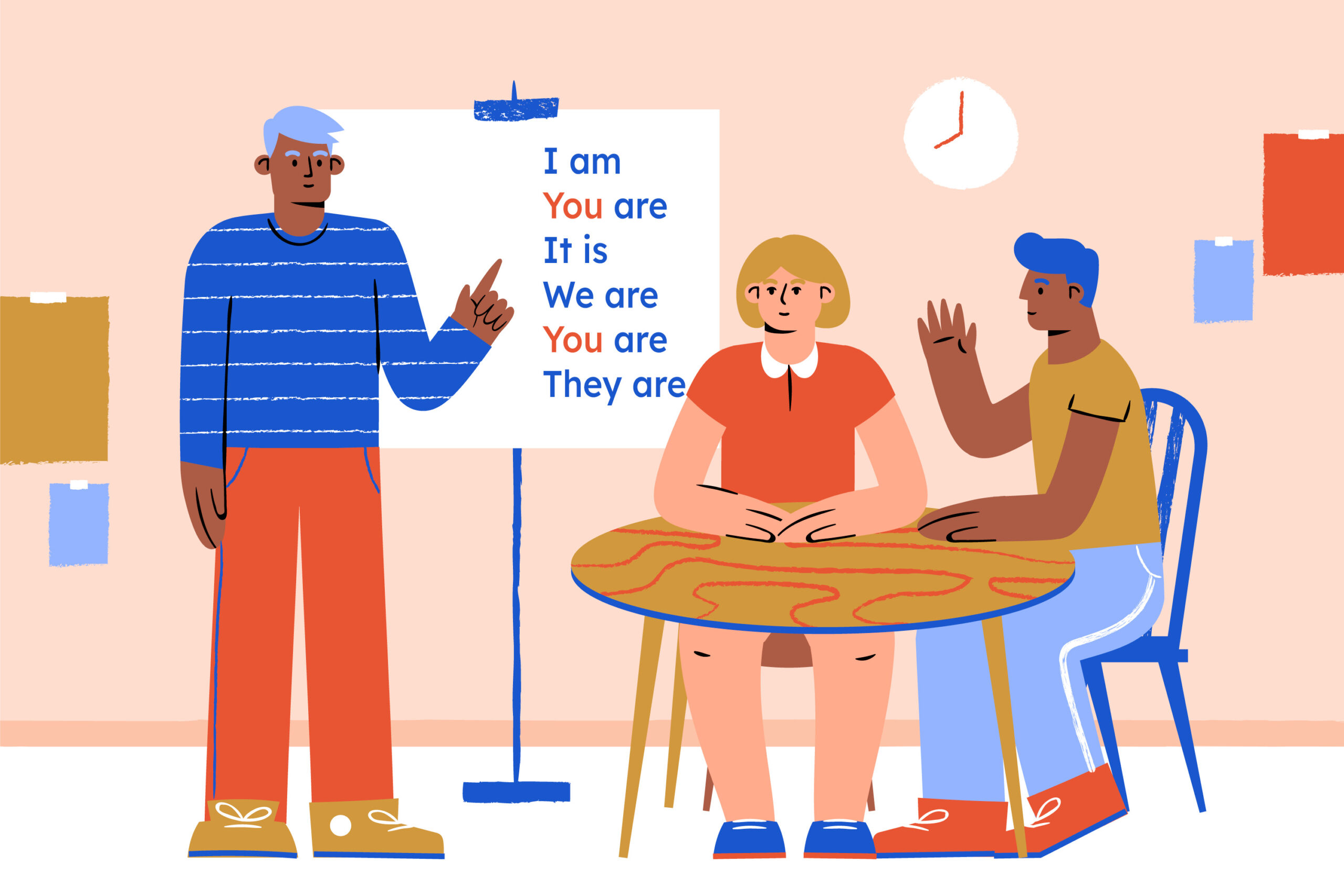Learn English step by step! Essential tips & strategies for adult ESL learners to build confidence & improve speaking, listening, and writing skills

Guess what? When you click and buy through our links, you’re doing more than improving your game. You’re supporting us in a way that doesn’t cost you extra but helps us keep bringing you the best drills and tips. It’s a slam dunk for both of us!
Table of Contents
- What Are the Best Strategies for Adults to Learn English Effectively?
- Building a Strong Foundation in English
- Developing Listening and Speaking Skills
- Reading and Writing for Beginners
- Learning English Pronunciation
- Using Technology and Apps to Learn English
- Overcoming Common Challenges in Learning English
- Practice Makes Perfect: Tips for Daily Practice
- Recommended Learning Materials and Resources
- Immersing Yourself in the Language
- Staying Motivated and Setting Long-Term Goals
- Final Thoughts
What Are the Best Strategies for Adults to Learn English Effectively?
The best way for adults to learn English is through consistent practice, real-life conversations, and immersion. Focus on listening, speaking, reading, and writing daily. Use practical strategies like language apps, study partners, and real-world practice. Keep reading to discover essential tips to accelerate your English learning journey!
Starting your English journey begins with understanding the building blocks of the language. We will start with the alphabet, dive into simple greetings and phrases, and cover basic vocabulary like numbers, days, and common objects to give you a solid foundation.
The Alphabet and Sounds: English has 26 letters, each with its unique sounds. Familiarizing yourself with these letters and their sounds is crucial. You can use alphabet charts or videos available online to practice each letter’s pronunciation. Listening to audio clips and repeating the sounds will help reinforce your learning.
Simple Greetings and Common Phrases: Learning common greetings and phrases can make everyday interactions smoother and more enjoyable. Start by memorizing essential words like ‘Hello,’ ‘Good morning,’ and ‘How are you?’ Practice these phrases with friends or family, and don’t be afraid to use them in real-life situations. This practice will help build your confidence.
Numbers, Days, and Basic Vocabulary: Knowing numbers, days of the week, colors, and names of family members enhances your basic communication skills. Begin with numbers from 1 to 10, and gradually include days of the week. Learning colors and names for common objects around you will enrich your vocabulary. Flashcards can be a handy tool for these exercises, making memorization fun and efficient.
Building a Strong Foundation in English
Mastering the basics gives you the confidence to tackle more complex aspects of English. We will explore key areas like grammar, simple conversations, and daily practice techniques to solidify your foundation.

Learning Basic Grammar: Grammar is the backbone of any language. Start with simple sentence structures like Subject-Verb-Object (e.g., ‘I eat apples’). Grasping the use of pronouns, the simple present tense, and articles (‘a,’ ‘an,’ ‘the’) will help you form coherent sentences. Use examples to practice, as seeing grammar in action makes it easier to understand.
Simple Conversations: Engaging in short conversations can significantly boost your language skills. Practice everyday dialogues, such as introducing yourself (‘Hi, I’m [Your Name]’), asking for directions (‘Where is the supermarket?’), or shopping phrases (‘How much is this?’). Learn to answer questions about yourself. These scenarios are practical and commonly encountered, making them perfect for practice.
Daily Practice and Repetition: Regular practice is key to learning any new skill. Make it a habit to use English daily. This could be through chatting with friends, writing simple notes, or even thinking in English. Repeating new words and phrases frequently will reinforce your learning and make them stick in your memory.
Combining these elements—grammar, conversations, and consistent practice—creates a robust foundation for your English learning journey. Keep at it, and the progress will show.
Developing Listening and Speaking Skills
Listening and speaking are crucial components of mastering English. Enhancing these skills will improve your ability to communicate effectively in various situations.

Listen to English Daily: Immerse yourself in the language by listening to English songs, podcasts, or watching videos and movies with subtitles. This exposure helps you get used to the rhythm and intonation of spoken English. Start with beginner-friendly resources tailored to new learners.
Practice Speaking Out Loud: Don’t be shy to practice speaking out loud. Doing so in front of a mirror can boost your confidence and help you observe your mouth’s movements. Practice speaking with family or friends, or even join a language exchange community to practice with native speakers.
Join English Conversation Groups or Classes: Engaging with others learning English can be highly beneficial. Join community classes, local meetups, or online groups to practice conversation. This environment provides you with real-time feedback and encouragement from peers and instructors.
By integrating these activities into your routine, you’ll notice a significant improvement in your listening and speaking abilities. Staying consistent and practicing regularly is key to developing your confidence and proficiency in using English in everyday situations.
Reading and Writing for Beginners
Starting with simple reading materials and basic writing skills can accelerate your English learning journey. We’ll look at recommended resources and practical exercises to enhance your reading and writing abilities.

Start with Simple Reading Materials: Delve into children’s books, ESL readers, or beginner-level articles tailored for new learners. These materials often use simple language and are easier to understand. You can find downloadable PDFs or online resources that are perfect for beginners.
Learn Basic Writing Skills: Begin by mastering simple sentence structures. Start with writing sentences that have a clear subject and verb. For example, ‘The cat sleeps.’ Practicing writing short passages like a self-introduction or describing a picture in one sentence helps reinforce your understanding of grammar and vocabulary.
Journaling: Keeping a daily journal in English can be incredibly beneficial. Write a few sentences each day about your experiences or thoughts. This practice not only improves your writing skills but also helps you think in English.
Reading Aloud: Combine reading and speaking practice by reading texts aloud. This technique aids in improving pronunciation and fluency. It’s also an excellent way to become more comfortable with the language.
By focusing on these reading and writing exercises, you’ll build a strong foundation that supports overall language proficiency. Regular practice and dedication will yield noticeable improvements.
Learning English Pronunciation
Mastering pronunciation is about familiarizing yourself with English sounds and the nuances of speaking clearly and correctly.
Focus on Phonics and Sound Patterns: English has unique sounds that might not exist in your native language. Take time to learn these phonics. Resources like phonetic charts, pronunciation videos, and audio clips can be incredibly helpful. Repetition is key, so listen and mimic the sounds as much as possible.
Practice Intonation and Stress: Understanding the rhythm of English is critical. Pay attention to sentence stress and intonation. For example, English often emphasizes key words in a sentence. Practice with listening exercises that focus on recognizing these stress patterns. Read aloud and try to replicate the intonation of native speakers in videos or recordings.
Record and Listen: Record yourself speaking and listen to the playback. This self-assessment helps identify areas where you need improvement. Compare your pronunciation with native speakers and tweak accordingly.
Use Pronunciation Apps: Many apps are designed to help you with pronunciation. These usually feature interactive exercises and instant feedback, making it easier to correct mistakes on the go.
Partner Practice: Pair up with a language partner or join a pronunciation-focused group. Speaking with others provides real-time feedback and helps you adapt to different accents and speaking styles.
Focusing on these pronunciation practices will greatly enhance your speaking clarity and overall communication skills. Consistent practice and the willingness to make adjustments are essential for improvement.
Using Technology and Apps to Learn English
Online Resources and Websites: The internet is filled with numerous resources designed to help beginners. Websites such as USA Learns, Quizlet, BBC Learning English, ESLgold, and others offer free lessons, exercises, and video content tailored to new learners. Bookmark these sites and visit them regularly for fresh content and practice exercises.

Mobile Apps: Use interactive mobile apps like EnglishClass101, Mondly, Duolingo, Babbel, and HelloTalk. These apps make learning engaging with gamified lessons and instant feedback on exercises. You can practice vocabulary, grammar, pronunciation, and even have conversations with language partners.
YouTube Channels for Beginners: Some YouTube channels focus on teaching English to beginners. Channels like “English Addict” or “Learn English with Lucy” provide video lessons on a variety of topics, including vocabulary, grammar, pronunciation, and common phrases. These videos can be a fun way to learn at your own pace.
Language Exchange Platforms: Platforms like Tandem or HelloTalk allow you to connect with native speakers who want to learn your language. This mutual learning environment can provide practical speaking and listening experience.
Podcasts and Audiobooks: Listening to beginner-friendly podcasts or audiobooks helps improve your auditory skills. Look for resources specifically designed for English learners, as they often speak more slowly and clearly, making it easier to follow along.
E-books and Online Articles: Access e-books and online articles through websites like Project Gutenberg or your local library’s digital collection. Start with simple, short reads to gradually build up your comprehension skills.
Practice What You Learn: Utilize these technological tools daily. Set aside specific times for using apps, watching video lessons, or engaging in language exchange. Consistency is key to retaining new information and making progress.
Overcoming Common Challenges in Learning English
Fear of Making Mistakes: Making mistakes is a natural part of learning any new skill. Embrace errors as opportunities to improve. Remember, everyone starts somewhere. Don’t hesitate to speak and write; practice is the best way to learn. Consider keeping track of your mistakes to see your progress over time.
| Common Challenge | Description | How to Overcome |
|---|---|---|
| Fear of Making Mistakes | Many adult learners are afraid of making mistakes, which can hinder their progress. | Embrace mistakes as part of the learning process. Practice speaking in a supportive environment where errors are accepted. |
| Limited Time for Practice | Busy schedules make it hard for adults to dedicate time to learning English regularly. | Incorporate English into daily routines, such as listening to podcasts during commutes or practicing vocabulary while cooking. |
| Lack of Confidence | Learners often feel shy or nervous about speaking English, especially with native speakers. | Start with simple conversations and gradually increase complexity. Join conversation groups to build confidence. |
| Difficulty Understanding Native Speakers | Understanding native speakers can be difficult due to fast speech and different accents. | Listen to various English accents through podcasts, movies, and YouTube channels. Practice listening regularly to improve comprehension. |
| Limited Vocabulary | Learners may struggle to express themselves due to a limited range of words. | Use flashcards, language apps, and daily journaling to expand vocabulary. |
Lack of Confidence: Building confidence comes with practice and positive reinforcement. Surround yourself with supportive people who encourage your learning. Start with simple conversations and gradually increase their complexity as your confidence grows. Additionally, engage in self-affirmation exercises to boost your self-esteem.
Limited Time for Practice: Many learners struggle to find time to practice English regularly. Integrate practice into your daily routine to overcome this challenge. Listen to English podcasts or audiobooks during commutes, practice vocabulary while cooking, or describe your day in English before bed. Even short, daily practice sessions can lead to significant progress over time.
Dealing with Frustration: Learning a new language can be frustrating. When you feel overwhelmed, take a break and come back to your studies with a fresh perspective. Break your learning into manageable chunks and set realistic goals.
Finding the Right Resources: With so many resources available, it can be challenging to know where to start. Stick to reputable resources and gradually add more as you become comfortable. Seek recommendations from teachers or language learning communities.
Practice Makes Perfect: Tips for Daily Practice
Consistent practice is vital for mastering English. Establishing daily routines and incorporating various practice methods will enhance your fluency over time.

Create a Daily Learning Routine: Allocate at least 15-30 minutes each day for English practice. Incorporate different activities like reading, writing, listening, and speaking to make the routine engaging and comprehensive. Consistency is key, even short daily sessions lead to steady progress.
Use Flashcards for Vocabulary: Flashcards are an effective tool for memorizing new words. Create your own or use digital apps. Review them regularly to reinforce your memory. Incorporate images and sentences to provide context for each word.
Keep a Language Journal: Writing a few sentences daily in a journal helps solidify your learning. Describe your daily activities, thoughts, or new vocabulary you’ve encountered. This practice sharpens both writing and cognitive skills.
Engage in Conversations: Make it a habit to converse in English whenever possible. Chat with friends, join language exchange groups, or participate in online forums. Real-life conversations provide practical experience and boost confidence.
Watch and Listen Actively: Active engagement with English media, whether it’s movies, podcasts, or music, significantly aids comprehension and pronunciation. Choose content tailored for beginners and note down any new vocabulary or phrases.
Set Achievable Goals: Break down your learning objectives into manageable tasks. Set weekly or monthly goals to measure your progress. Celebrate small victories to stay motivated and maintain a positive outlook towards your learning journey.
Recommended Learning Materials and Resources
Books for Beginner Learners: Foundational dictionaries like Oxford Picture Dictionary, textbooks like Ventures Basic Value Pack ‘English Grammar in Use’ by Raymond Murphy or ‘Essential English Words‘ by Paul Nation are excellent starting points. These books cover basic grammar rules and vocabulary practice effectively. ESL readers designed for beginners are also useful as they provide graded reading material to build up comprehension.

Online Courses and Tutorials: Utilize free or affordable online courses on platforms like Coursera, edX, or futurelearn. They offer structured lessons taught by experienced instructors. Websites like OpenLearn and Alison also provide quality, free courses for language learners.
ESL YouTube Channels and Podcasts: Channels such as ‘English Addict’ and ‘Learn English with Lucy’ offer a variety of lessons encompassing grammar, vocabulary, and pronunciation. Podcasts like ‘ESL Pod’ and ‘The English We Speak’ are also designed specifically for learners, making it easy to follow along at your own pace.
Mobile Apps and Software: Apps like Mondly, English Class 101, Duolingo, Babbel, and Memrise provide interactive and gamified learning experiences that make practicing English fun and engaging. These apps can be used in short, daily sessions, ideal for fitting into a busy schedule. Software programs like Rosetta Stone and Pimsleur also offer comprehensive learning tools.
Local Resources: Don’t overlook local libraries and community centers. Many offer beginner English classes, language learning books, and other resources you can borrow. Libraries often provide access to digital resources such as eBooks and audiobooks designed for new learners.
Interactive Platforms: Websites like Tandem, HelloTalk, and ConversationExchange.com allow you to connect with native speakers interested in language exchange. These platforms offer real-time practice and chances to apply what you’ve learned in conversational settings.
Immersing Yourself in the Language
Using English in daily life goes beyond structured practice sessions. Integrating the language into your daily activities accelerates your learning process.

Engage in English Media: Watch TV shows, movies, or YouTube videos in English. Listen to English music and try to understand the lyrics. Reading English newspapers, magazines, or blogs can also be beneficial.
Practice with Native Speakers: If possible, interact with native speakers. Regular conversations help in understanding slang, idiomatic expressions, and cultural nuances that aren’t always covered in textbooks.
Label Your Surroundings: A practical tip is to label common objects around your home with their English names. This constant visual exposure reinforces your vocabulary.
Think in English: Train your mind to think in English. It could be as simple as describing the tasks you’re doing or planning your day entirely in English. This habit can significantly improve your fluency.
Participate in Online Communities: Follow me on Facebook and X (formerly Twitter). Join online forums, social media groups, or other communities that focus on learning English. These platforms provide a space to ask questions, share experiences, and receive support from fellow learners.
Celebrate Small Wins: Learning a language is a marathon, not a sprint. Celebrate your progress, no matter how small. Recognize your achievements and use them as motivation to keep going.
Staying Motivated and Setting Long-Term Goals
Maintaining Motivation: Staying motivated during your English learning journey is essential. Remind yourself of why you wanted to learn English in the first place. Keep a list of your goals and revisit them regularly to stay focused.

Track Your Progress: Keep a record of your achievements and the milestones you’ve reached. Use a journal, app, or even a simple checklist to track your progress. Seeing how far you’ve come can be a great motivator.
Set Realistic Long-Term Goals: While daily practice is crucial, having long-term goals gives you direction. Whether it’s passing a language proficiency test, traveling to an English-speaking country, or advancing in your career, well-defined goals keep you on track.
Mix Up Your Learning Routine: To prevent burnout, vary your learning activities. Combine reading, writing, listening, and speaking exercises with engaging activities like watching movies, joining clubs, or playing language-based games.
Find a Study Buddy: Partnering with someone who shares your learning goals can make the process more enjoyable. You can motivate each other, share resources, and practice conversations together.
Celebrate Your Successes: Take the time to celebrate your achievements, no matter how small. This positive reinforcement fuels your motivation and helps you stay committed to your learning journey.yu
If you are interested in private, one-on-one, small group or large group teaching or tutoring, contact me here so we can discuss your needs.
Final Thoughts
What do think? Is English a difficult language to learn? Have I helped you by what is in this article?
I encourage you to stay motivated and to immerse yourself in English by practicing as often as possible and speaking English with others regularly.
You learn by doing.
There’s lots of help available if you want it.
Join my Study Buddy group on Facebook.
Subscribe to my email list to receive learning material from me in your email.
Share your thoughts in the section below. I’m interested in hearing from you. I will always reply.

“Beginner’s Guide to Learning English: Essential Tips and Strategies for Adult ESL Learners” is an invaluable resource for adults embarking on their English language learning journey. This guide often addresses practical techniques tailored to adult learners’ needs, such as:
Goal Setting: Establish clear, achievable objectives to maintain motivation and track progress.
Immersive Practice: Engage in daily practice through reading, writing, listening, and speaking to build proficiency.
Utilizing Technology: Leverage apps, online courses, and language exchange platforms for interactive learning.
Cultural Integration: Incorporate cultural elements to enhance understanding and contextual use of the language.
Consistent Review: Regularly review material to reinforce learning and improve retention.
Language Partners: Practice with native speakers or fellow learners to gain confidence and practical experience.
Overall, the guide provides a structured approach, emphasizing consistency, practical application, and the use of modern tools, which are crucial for adult ESL learners to succeed and thrive in learning English.
Hi Skyline Goods, thanks for your comments. Leave comments and questions here anytime.
KBob